“Firstborn”
Written by Mark Kalbfeld and Rene Echevarria
Directed by Jonathan West
Season 7, Episode 21
Production episode 40276-273
Original air date: April 25, 1994
Stardate: 47779.4
Captain’s Log: Worf is rehearsing a speech he wishes to make to Alexander—who is late in arriving to hear it. He finally shows up being chased by Eric, with whom he is engaged in a water balloon fight. Inevitably, Eric hits Worf with the water balloon, prompting Eric to run like hell.
Undeterred by the water stain on his uniform and baldric, Worf gives his speech, and mostly gets it right: it’s time for Alexander’s first Rite of Ascension. But Alexander doesn’t want to be a warrior. His mother always said he could avoid that Klingon stuff if he wanted, and Worf reluctantly admits that it is his choice. But Worf is not happy. He’s distracted during a staff meeting, and Picard asks what’s wrong. When Worf tells him, Picard reminds him that Alexander’s spent almost no time among Klingons. The following day is a festival called Kot’baval, and they’re proximate to a Klingon outpost that should be celebrating it, so the Enterprise heads there.
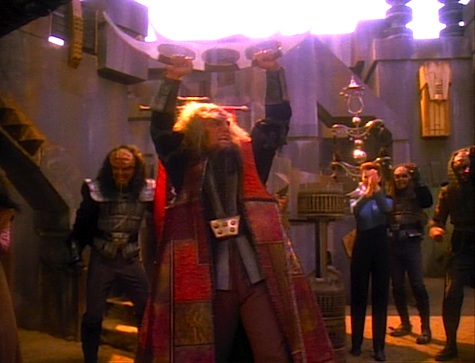
The festival is going full blast, with Klingons and Enterprise personnel checking out the stalls and watching the performances. Worf even gets involved in an audience-participation segment involving singing and miming bat’leth fights against the tyrant Molor—and he convinces Alexander to do the same, to the initial confusion of the singer playing Molor, who then gamely lets Alexander defeat him. The performance ends with a singer playing Kahless defeating Molor. Alexander enjoys the heck out of it and the rest of the festival—though Worf manages to convince him not to pay fifty darseks to look at the mummified head of Molor—until they’re jumped by three assassins. A mysterious Klingon shoots one, and Worf is able to deal with the others.
The Klingon reveals himself to be K’mtar, the gin’tak of the House of Mogh. He says he was sent by Worf’s brother Kurn to protect Worf from a possible assassin. Riker’s a little peeved that K’mtar wasn’t more overt in his warning, neither contacting the Enterprise nor revealing himself to Worf until the attack happened. The assassin had a d’k tahg belonging to the House of Duras, which means Lursa and B’Etor are behind the attack. Riker offers to use the Enterprise’s resources to try to find them. Meanwhile, K’mtar is concerned about Alexander—he is the only male heir that either Worf or Kurn has, and he may lead the House of Mogh some day. K’mtar offers his assistance in convincing Alexander to choose the path of a warrior.
Riker contacts Quark on Deep Space 9, where Lursa and B’Etor were last seen. In exchange for Riker forgiving the debt Quark owes him for winning triple down dabo at his bar the last time the Enterprise was at DS9, the Ferengi reveals that the sisters were buying mining equipment to use in the Kalla system. K’mtar is impressed—he did not expect the Enterprise to be able to find the sisters.
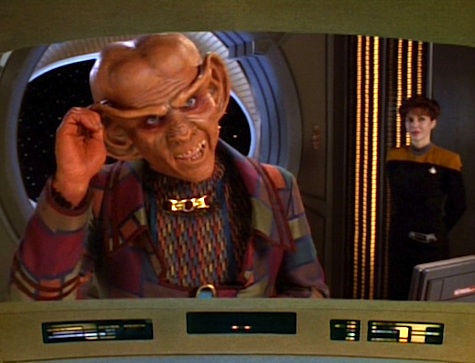
K’mtar brings Alexander to the holodeck, where he re-creates the scene of the assassination attempt. However, when given the chance to finish his opponent off, Alexander refuses and runs out of the holodeck, despite K’mtar’s rather insistent urging.
The Enterprise arrives in the Kallas system. Data leads an away team including La Forge, Worf, and a guard. They find a lone Dopterian named Gorta, who was left stranded in the mine by Lursa and B’Etor. In exchange for being rescued, Gorta tells them that the sisters were planning to sell the magnesite they mined to a Yridian in the Ufandi system.
K’mtar and Worf talk in Ten-Forward. Worf expresses frustration. He wishes to honor K’Ehleyr’s desires for Alexander to find his own path and not have “Klingon nonsense” forced down his throat. K’mtar insists that Alexander should be sent to the Klingon military academy or he will never become the warrior he will need to be to lead the House of Mogh. K’mtar even threatens to use his authority as House gin’tak to remove Alexander from Worf’s custody.
K’mtar then tries to go after Alexander directly, but has no more luck. Alexander doesn’t want to become a warrior, and K’mtar’s insistence is seemingly out of proportion to the situation.
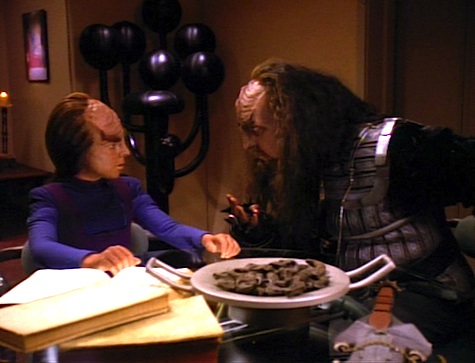
The Enterprise finds a Yridian freighter in the Ufandi system that has only some of the magnesite that Lursa and B’Etor mined. Riker offers to purchase the magnesite from Yog the Yridian, which he then beams off the starboard bow and has Worf blow it up with phasers. The explosion reveals a cloaked Bird of Prey, which is immediately tractored. Lursa and B’Etor are pissed, insisting a) that they’re engaged in a simple business transaction and b) they don’t know a damn thing about any attempt on Worf’s life (though they regret its lack of success). They beam over and Worf shows them the d’k tahg. It is indeed from their House—but then B’Etor notices something wrong. The markings on the hilt include one for Lursa’s son—but Lursa has no son, though she just learned two days ago that she was with child. Only she and B’Etor know she’s even pregnant. The dagger has to be a forgery.
Worf goes to speak with K’mtar and finds him preparing to shoot Alexander with a disruptor. As Worf is about to kill him, K’mtar says that he’s Alexander from forty years in the future. He proves he is really the adult Alexander by describing what happened when K’Ehleyr died in “Reunion” in gory detail. He came back in time in the hopes that he would change his own past. Alexander did not become a warrior, instead becoming a diplomat who, when he became head of the House of Mogh, tried to bring an end to inter-House feuding in the empire. He failed, and Worf was killed on the floor of the Council Chamber. “K’mtar” staged the assassination attempt in the hopes that it would scare young Alexander into becoming a warrior. But it didn’t work, and he tried to kill his younger self in a last-ditch attempt to keep him from having to watch another parent die in his arms.
But Worf points out that he’s already changed the past. He may not have affected Alexander directly, but he has affected Worf.
Later, Worf finds Alexander on the holodeck preparing to train. Worf tells him that K’mtar had to leave but that he wishes Alexander well. And then Worf takes him off the holodeck, saying that there’s time to train later.
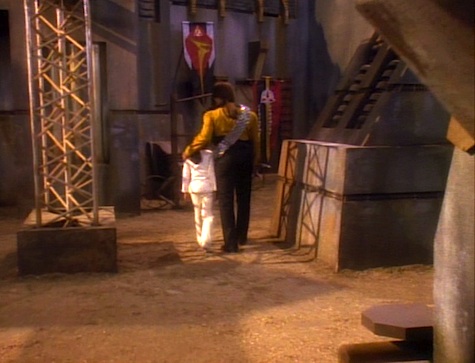
Thank You, Counselor Obvious: When Riker purchases the magnesite ore from the Yridian, Troi looks at him and says, “You’re up to something,” on the off chance that we couldn’t figure it out for ourselves.
There is No Honor in Being Pummeled: Worf really is the worst parent ever. He does such a bad job with Alexander that it leads to his own death and his son messing with time travel to try to fix it, and then doing so in a manner that was pretty much doomed to failure.
What Happens on the Holodeck Stays on the Holodeck: “K’mtar” uses the holodeck to train Alexander, freezing his opponent periodically as a method of showing him how to notice shifting of weight and stuff like that.
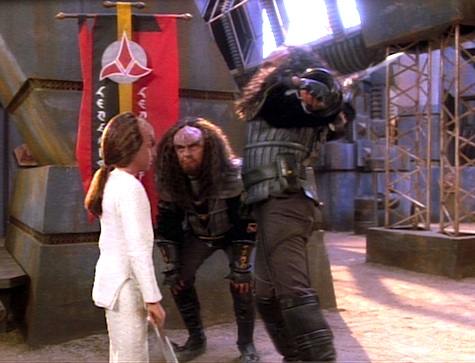
In the Driver’s Seat: Ensign Gates is back at conn, and back to being silent.
I Believe I Said That: “Big talk, small tips.”
Quark describing Lursa and B’Etor.
Welcome Aboard: This is Brian Bonsall’s last appearance as Alexander. The character will return on several episodes Deep Space Nine played by Marc Worden.
James Sloyan makes his third Trek appearance as “K’mtar,” having previously played Admiral Jarok in “The Defector” and Dr. Mora Pol on DS9’s “The Alternate”; he’ll play the title role in Voyager’s “Jetrel” and reprise Dr. Mora on DS9. Armin Shimerman makes his fourth TNG appearance as Quark (his regular role on DS9), having played two other Ferengi in “The Last Outpost” and “Peak Performance” and the greeting box in “Haven”; he’ll also guest star as Quark on Voyager’s pilot episode “Caretaker,” while continuing the role on DS9’s entire run. Barbara March and Gwynyth Walsh, having last been seen on DS9’s “Past Prologue,” return as Lursa and B’Etor; they’ll be back for the final time in Star Trek Generations. Joel Swetow, last seen on DS9’s pilot episode “Emissary” as Gul Jasad, plays Yog the Yridian, and Colin Mitchell, who has never appeared on DS9, plays Gorta; both are delightfully smarmy and obnoxious. Finally, Rickey D’Shon Collins makes his third and final appearance as Eric having previously been in “Liaisons” and “Masks.”
Trivial Matters: Though Kurn does not appear in this episode, it’s established that he still has his seat on the High Council, as established in “Rightful Heir.”
In the final episode of DS9, Worf was made Federation Ambassador to the Klingon Empire. By the time we saw the character again in Star Trek Nemesis (which took place four years after DS9’s finale), he was back in Starfleet. Your humble rewatcher was tasked with resolving this discrepancy in his novel A Time for War, a Time for Peace, and when Worf resigns his ambassadorship, he nominates Alexander to replace him. When he does so, he mentions that he had a vision of Alexander’s future, an oblique reference to the events of this episode. Alexander continued as ambassador in Articles of the Federation.
Alexander says he has never been to the homeworld, which is a neat trick given that he was the son of the Federation ambassador to the empire. In the aforementioned A Time for War, a Time for Peace, I established that K’Ehleyr never let Alexander out of the embassy, which was Federation soil, so technically his statement would be true, while still allowing his childhood to make sense.
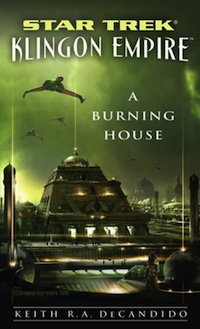
The term gin’tak was also used in “Birthright, Part II” as a spear. I established in my Klingon Empire novel A Burning House that a House gin’tak like K’mtar is the spear that defends a House.
“K’mtar” tells Alexander the story of Kahless and Morath that Worf told Alexander in “New Ground.”
Riker’s success at Quark’s dabo table will become something of a plot point in the DS9 episode “Defiant.”
This story was the folding together of two concepts, one by Mark Kalbfeld, who got story credit, and one from staff writer Joe Menosky, who pitched the notion of Alexander falling into a time portal and coming back moments later as a twenty-five year old. The latter was later recycled into the plot for DS9’s “Time’s Orphan” with the character of Molly O’Brien.
It is unclear whether or not Lursa has her son before she and B’Etor are killed in Star Trek Generations, and the infant may even have been on their ship when it was destroyed. Either way, Alexander’s time travel had to have changed history to bring about their deaths sooner. If they had successfully held onto the magnesite, they might not have gotten into bed with Soren.
Worf is very sure that Alexander has created a new timeline, a surety no doubt born of his adventures in “Parallels.”
Make it So: “I love you, father.” This actually isn’t a bad little episode—but it isn’t really a good little episode, either. For the second episode in a row, we get a final look at an annoying kid on the Enterprise (though Worf being placed in DS9’s cast two seasons hence means it’s not Alexander’s final appearance altogether), and it’s filled with some nice bits but doesn’t really add up to much.
The biggest problem is that Alexander’s plan is dumb from the ground up and dumb from the roof on down the other side. To make matters worse, it’s badly executed. The detail of the extra character on the d’k tahg was an obvious problem, but it’s also obvious that Alexander never expected the sisters to be found. That, however, points up another problem: Alexander lived on the Enterprise. He knows exactly how resourceful this crew is. Why would he be surprised that they’d go after Lursa and B’Etor or that they’d be successful? And while seeing “K’mtar” aim his disruptor at himself makes for an impressive image, on what planet does killing his younger self make sense?
Then again, Alexander was a dumb kid, makes sense he’d be a dumb adult.
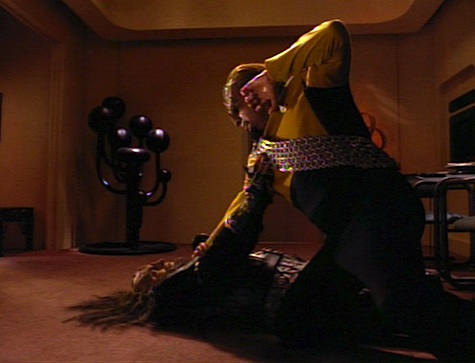
Having said that, the episode has some magnificent bits. The Kot’baval festival is very well done and adds nicely to the tapestry of Klingon culture. James Sloyan is as stupendous as ever as “K’mtar,” his amazing voice and superb emotional range utterly selling the adult Alexander’s intensity and obsession with his mission. It’s always fun to watch Barbara March and Gwynyth Walsh sneer as the Duras sisters, the scenes with Yog and Gorta are absolute delights, and it’s almost impossible for a scene with Armin Shimerman as Quark to be anything other than fantastic, and his banter with Jonathan Frakes here definitely qualifies.
Warp factor rating: 5
Keith R.A. DeCandido actually enjoyed writing Alexander in A Time for War, a Time for Peace and Articles of the Federation, despite having always found the character dopey and annoying. Go fig’. Keith is a best-selling and award-winning author of some 50 novels, the latest of which is Leverage: The Zoo Job, and tons of other stuff. Go to his web site for links to order his books, to his blog, his Facebook page, his Twitter feed, his various and sundry podcasts, and tons more.










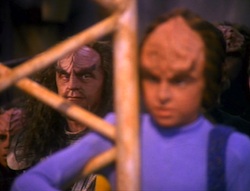
I enjoyed James Sloyan performance especially the final scene between Worf and K’mtar in there quarters. Alexander’s plan to change history makes no sense, and killing your younger self to avoid emotional trama is just insane. Quark and the Duras sisters were entertaining as always and the guest stars almost made up for the eye rolling plot.
Oh, THIS episode… Troi’s empathic skills must have been medically removed for the entire time she was in any room with “K’mtar.”
I’m on the opposite side here. I really liked this episode. Probably because the ending where Worf looked like he finally understood what to do as a father made me very happy.
The criticism of the time traveling plot and the stupidity of adult Alexander is totally waranted, but I have to say I was so interested in the relationship dynamics between Worf and Alexander (as well as the good performances turned in all around) that I didn’t even think about that until my little brother brought it up later.
Very enjoyable episode for me!
@1: “…killing your younger self to avoid emotional trama is just insane.”
True… but come to think of it, it makes about as much sense as letting a pre-warp culture go extinct for fear of damaging them (cf. “Pen Pals,” “Homeward”). Very similar (il)logic there.
And come to think of it, avoiding pain is the usual excuse of people who decide to kill themselves.
I’m not too fond of anything involving Alexander, but Sloyan is always worth watching.
Sloyan deserved (and still deserves) to be in more things. Easily my favorite guest actor from Trek. You can’t beat that voice… well, unless your name is James Earl Jones.
“it’s almost impossible for a scene with Armin Shimerman as Quark to be anything other than fantastic”
Remember that when you get to the rewatch for Profit and Lace…
bhebert: “Profit and Lace” is the primary reason for the use of the word “almost” in that phrase. :)
—Keith R.A. DeCandido
Does it seem odd to anyone that they can just divert the Enterprise from whatever it’s mission is, to this Klingon outpost just because one officer is having family problems?
They then undertake the whole pursuit of the Duras sisters, although that makes more since, as Worf was attacked. Though I wonder how far they would actually pursue that. How long would they chase after the Duras…days, weeks, months? (Yes, I know the answer, about 47 minutes).
I’m glad I’m not the only one who hates “Profit and Lace.”
@5: Or Christopher Lee.
I like the nice touch that adult Alexander had the same forehead makeup…something you wouldn’t notice unless you were watching for it. That being said, would a Klingon fail to notice something like that? Especially if that Klingon were your father? Since each Klingon forehead is unique, for them it is pretty much part of recognizing a face. Maybe it’s that much of a background characteristic for them that the dissonance of seeing an adult version of his son doesn’t make him put it together right away…but since they’re also the “ridges of a warrior,” I can’t help but wonder if Klingons secretly check out each other’s forehead ridges whenever they meet one another.
I really like how Data was progressing at this point. After seeing him joke with Geordi and Wesley last episode, here we get to see him chiming in on the interrogation tactics: “Gather your belongings, it is time to leave.”
One other question…I don’t remember if this was mentioned in the episode, but has Alexander been on the ship the whole time since he got back from wherever he was in “Parallels?” Did he de-evolve? Was he in school when Worf was ripping up their quarters?
One thing that bugs me in hindsight is that this episode ends with Worf and Alexander seeming to finally understand each other. Worf is emphatic about the idea that Alexander belongs with him when sending him to boarding school is suggested. They even have a walk off into the distance happily ever after moment at the end.
Yet when it comes time to go to DS9, Worf completely forgets about Alexander and sends him back to the same people who years before said they couldn’t raise him.
The inconsistency of Alexander’s story arc is just icing. Icing on the hate cake.
Then again, Alexander was a dumb kid, makes sense he’d be a dumb adult.
Every parent’s worst nightmare.
James Sloyan: one of my favourite character actors on Trek. Fantastic voice, great presence. Even if the writing on “First Born” was less than stellar.
@9: As far as I could tell, Michael Westmore-style Klingon ridge patterns ran in families. Kurn and Alexander had much the same ridges as Worf, all the various members of the House of Duras had the same ridges, etc. (Although that makes me wonder if ridge patterns are passed down only from the father.) So Worf may have accepted K’mtar as a distant relative.
I liked it as it seemed to show Worf finally being able to accept his son for who he is. Bad parent or not, that was a major step in the right direction. And it also showed just how much Alexander loved his father, to the point of if he can’t change his own destiny, then he would kill his younger self, with the hope of erasing himself from the timeline, giving Worf that much more chance to continue living.
This was the first episode where I actually NOTICED the same actor playing a new part, as The Defector had always been a favorite of mine. J Sloyan is just awesome again here. Killing his younger self, I agree, is strange, but I’ve never watched and thought, “Alexander is such a stupid kid.” I think older Alexander planned on dropping in, faking the assasination, and that would be enough; that SHOULD be enough to convince young Alexander to want to train. the prospect of losing his 2nd parent should be the push he needs. And what winds up being nice about the episode is that once old Alexander’s hurt feelings are peeled back, he can see what a good time the two had together on the Enterprise, learning about each other. Im sure their relationship only grows stronger from this point on.
By the way, it was nice to see Worf be able to take down a couple of guys for a change. He always seemd like he could do this, but always failed. While Alexander (younger & older) look on, Worf was “too much for them!” There SHOULD be much more of this to point to, but there isn’t. Unfortuntalely.
While I understand that Season 7 is about tying up loose ends (and pulling out the previously discarded and throwing it at the wall) I didn’t particularly care for this episode. I actually didn’t mind that it was Worf, who was the least nurturing of all characters who was the parent- it created conflict, which I am all about. So when it came time for “Alexander’s last appearance” I was sort of looking forward to it. But when you throw in the random time travel (how exactly did Old Alexander get back in time, and what happened to him afterwards?) and that either Worf, who is the head of the House of Mogh doesn’t know who his K’mptec is or never bothered to background check the guy- it just crosses the line into annoying.
I think you could have done a “Alexander becomes interested in his heritage” story without those elements. Take it to the point where they go the planet for the holiday and then have something happen (a crime, an accident, stuck miners, whatever mcguffin you like) and Alexander gets exposed more. But when you get into the time travel aspect, it just gets overly complicated.
By the way, in my novel Department of Temporal Investigations: Watching the Clock, I threw in a line implying that the “man in the Cambra system” who gave K’mtar/Alexander the means to travel into the past was actually Korath, the Klingon who provided Admiral Janeway with the time machine in Voyager: “Endgame.” After all, Future Alexander came from about 2410, and the future portions of “Endgame” are in 2404. So if you have two instances of Klingons having access to time machines in the same decade, it’s reasonable to conclude they’re connected. And it makes Alexander’s access to a time machine feel a tiny bit less random.
I always wondered how Worf explalined the dagger to Lursa and B’Etor afterwards, since that was never shown on screen: “Um, well, this is awkward, but the dagger had the symbol of your as-yet-unborn son on it because some guy brought it with him from the future, so um, never mind, accusation withdrawn.”
This was an episode I was fairly interested in, until we found out the twist, which pretty much ruined it for me, as others have chimed in.
I do love Lursa and B’Etor though. Also, Quark definitely seemed like a real character to me, not just a cartoon Ferengi. So that was fun to watch too.
Yes, Alexander is as dumb as a bag of hammers. He decides here to reject Klingon cultural imperatives to become a warrior, and then goes and decides to fight in the Dominion War by joining the Klingon military which he is singularly unprepared for. Of course someone with Alexander’s level of competence will grow up to be a Federation diplomat. “Captain Picard, K’mtar has shown me Alexander’s future decision making skills. I ask you to teach me to facepalm, immediately!
I think sometimes these reviews get caught up in the minutae of plot lines, believability, etc. My view is this whole thing is fiction so I don’t focus as much on it, unless it is so obvious or bad it takes away from the story. This episode has so much going for it, that it doesn’t deserve to end up with the same middling score of 5 as many of the others that were rated a 5. It is at least a 7, maybe an 8. The performances are simply too good, and there is too much interesting and cool stuff going on this to be called barely average. My two cents
@23
Couldn’t have said it better.
@8 I think they did a pretty good job of explaining it actually. They said that a planned rendezvous was delayed and they were going to survey a nearby nebula while they waited. Then in Picard’s conversation with Worf, they said that the nebula was between their current location and the colony.
Agree with Alex @23. I know that one of the passions of Trekkies in general is the dissection of plot and scientific plausibility. I took one semester of biology in college as my entire science background. I don’t watch TNG because it’s a science fiction show. I watch it because it is filled with compelling multifaceted characters as part of a fascinating make-believe universe. I do appreciate it when plots and story lines are tightly drawn and consistent. But even when they are not, with just a few rare exceptions, I have been entertained by all of these episodes, because typically speaking the acting and nuance is beyond what you get another serial aised television programs. My own personal rewatch on Netflix is winding down, & I find myself already missing these characters in this particular setting. As for this episode, yes Alexander was a bit of a ninny, and there are gaps in logic here that just don’t make sense. But as others have noted, the guest actors and the performances of the regulars made this another fun episode for me to watch, and shed more light on these characters for me. So, in summary, I’m good.
The adult Alexander only appeared in two episodes of DS9 KRAD, Sons and Daughters and You Are Cordially Invited. Wasn’t Star Trek: Nemesis 3yrs after the end of DS9, KRAD? The series ended in 1999 and Nemesis was made in 2002. The Quark scene could never have flew with Picard (although he does get a view screen scene with another Ferengi in Bloodlines next time) but another bad thing happens with Riker in command and Picard away from the Enterprise; a murder attempt on the ship’s security chief, even if it was staged. Is it just me or does Michael Dorn looks visibly embarrassed in his last scene with James Sloyan when the two are hugging?
@27: Well, it is kind of weird to be hugging your son from the future who’s older than you.
You know, I’ve never been entirely convinced that Worf is back in Starfleet in Star Trek: Nemesis. I get that there’s a cut scene, and a ton of tie-in fiction based around that premise, but I just figured that he was there for Riker and Troi’s wedding, threw on his old uniform as a Starfleet inactive and then went back to his ambassadorial role afterwards. (The clincher: He’s wearing his old DS9 uniform rather than being back in a security chief’s uniform, even though that’s the role he seems to be performing. And yes, I know the novels explained that but I doubt anyone making the movie thought of it.)
cap-mjb: As the person who did the most with Worf as an ambassador in the tie-in fiction, I like your scenario, but I also like the fact that he’s now first officer of the Enterprise, too.
—Keith R.A. DeCandido
Is it possible to date a voice? Because I’d listen to James Sloyan and Marc Alaimo all day long. I mean, Alaimo played an evil dude and I still liked listening to him. Doesn’t really matter what they say, I’d just keep listening. Shimmerman is so delightful as Quark. My brain can never wrap around that it was the same actor for Buffy. Well, I’m off plot here but it is the 7th season.
But… he looks exactly the same even through the Quark make-up, and sounds the same…
Worf surely is trusting. He allows a stranger to live closely with him and his son only because the stranger has helped him in a fight and claims to be sent by his brother? This could have gone very wrong.
“I met a guy with a time machine” is bad plotting. Time travel didn’t use to be so easy.
I liked Picard’s reaction to Worf’s being distracted, the festival on the planet, and the ending. The whole Klingon warrior ethics sometimes feels at odds with Star Trek’s dedication to peace and nonviolence, so it did me good to hear Worf praise the cause of peace and encourage Alexander to carry on.
@33/Jana: ““I met a guy with a time machine” is bad plotting. Time travel didn’t use to be so easy.”
But it had been previously established in “Captain’s Holiday” and “A Matter of Time” that time travel would become easier to obtain in the future, routine enough that historians would use it for scholarly missions. So the groundwork had already been laid earlier in the series.
@33 He has the right shape of head. I believe it is canon that Klingon head ridges are family specific, so the head ridges fit meaning the guy can be trusted.
@34/Christopher: But that was in the far future, in the 26th century. And it makes more sense to assume that only historians travel in time, that they have found some way to control or restrict time travel. Otherwise anyone could grab a time machine and change history.
@35/random22: Good point.
@36/Jana: Yes, it was the 26th century, but if time travel was routine enough for scholarly use by then, it stands to reason that it would’ve been an emerging technology even earlier. I mean, obviously, Starfleet discovered the means to travel through time in the 23rd century, although it resisted developing the technology after that. But with so many other neighbor species on the same rough technological level as the UFP, it’s only a matter of time (heh) before they discover time travel on their own and the technology gets out.
I addressed this in my two Department of Temporal Investigations novels. I posited that, after the early experiments with historical research through the slingshot effect (“Assignment: Earth”) and the Guardian of Forever (“Yesteryear”) nearly had catastrophic effects on the timeline, the Federation established the Temporal Prime Directive and the DTI to restrict time-travel use and proliferation. Other galactic governments, aware of the same risks, generally have similar restrictions of their own and cooperate in maintaining the ban. But the theoretical foundations and practical, empirical data are already there. So if someone did defy the restrictions and research it anyway, it wouldn’t take long to achieve a breakthrough. We saw this with Korath’s temporal deflector in the early 2400s in VGR: “Endgame,” and as I mentioned above, I implied in Watching the Clock that Korath was the same guy who gave future Alexander his time machine. In my version of future history, Korath is the guy who finally invents an actual time machine, a controlled, non-accidental means of traveling through time that doesn’t require some dangerous interaction of a warp engine and a stellar gravitational field. I loved the idea that, of all the Alpha/Beta Quadrant species, it was a Klingon scientist who did it first. It’s so unexpected.
@37/Christopher: Doesn’t the DTI also monitor the timeline and prevent unauthorised time travel from happening? I like that, because without such an organisation, time travel would be everywhere and reality would be a mess.
@38/Jana: In my books, the DTI doesn’t engage in time travel itself and has only a limited ability to pre-empt it. They can enforce laws discouraging the development of time machines and try to secure time-travel relics and natural phenomena before anyone can use them. But more active time policing is the job of temporal agencies further in the future, like the Starfleet Temporal Integrity Commission from VGR: “Relativity” or Daniels’s Federation Temporal Agency from ENT. Howard Weinstein’s DC Star Trek comics established back in the ’90s that Gary Seven’s agency, which Howie named the Aegis, was also involved in protecting the timeline from change, a callback to the premise of the original 1966 Assignment: Earth series proposal before it was retooled into a Trek episode. As I explained it, the Temporal Cold War was basically a struggle between the time-travelling factions trying to preserve the timeline and the ones trying to alter it.
One concept I borrowed from David A. McIntee’s TNG novel Indistinguishable from Magic is that the slingshot effect is much harder to achieve and more dangerous than TOS and the movies implied, so that doing it successfully is a fluke — otherwise anyone with a warp drive could do it and the timeline would be in chaos. I posited in DTI: Forgotten History that the Enterprise‘s time warp in “The Naked Time” altered its engines in a way that let them achieve a slingshot successfully where other ships would fail, and that only Spock and Scott knew the modifications well enough to duplicate the effect with the Bounty in TVH.
@39/Christopher: Okay, it makes sense that there would be several organisations from different centuries dedicated to the protection of the timeline. I also agree about the slingshot effect. I’ve read Forgotten History and liked your explanation, including how Spock and Scotty learned to duplicate the modifications.
I guess Alexander just slipped through the net.
Interesting how Alexander comes from 2410 “or so”.
I say this entirely because of the prologue of one of the stories of Star Trek Online, of course. Which takes place, officially, about May or June 2409, Earth time, and involves someone calling himself “K’mtar” and General Worf telling my Orion captain, “That is NOT his name”. They rewrote the beginning just enough to move the Wham Line about fifteen minutes before it originally was. “If it isn’t Alexander… oh, excuse me, ‘K’mtar’…”
I won’t spoil it for you, except that I feel like the mood is screwed up by the fact that the game writers suddenly thought they were writing for Obsidian under contract to BioWare so a speech goes on… and on… and ON… seriously, they needed to edit that down a bit. Having said that… 2409 is ‘or so’ compared to 2410… and history WAS changed or branched… and I have made this way too obvious that my intent to not spoil is probably rendered silly. This timeline is probably going to be rendered ‘an alternate branch’ as it is when ‘Picard’ debuts anyway, but I still find it interesting how writers cannot resist the Anvil of Irony.
Eh, I haven’t seen this one in a long time, but given what I remember of it, a rating of 3 is all it deserves. The actual K’mtar/Alexander plot plays out with no energy, and then you get to the obvious time travel paradox. The side-stories are the most interesting part. The writers talk about several rules Roddenberry had laid down, one of which was “no time travel.” Obviously they worked around that a number of ways, and you could argue this is another workaround, but it sure feels like breaking it. I’m all for the writers breaking “the rules” now and then, but in this case all it enables is a forgettable B script. I love Sci-fi that does a good job exploring time travel paradoxes – I’m all for that – but here the story just stumbles right through them (making Alexander look like an idiot). It’s kind of like kissing the prettiest girl in school, only to find she’s got bad breath.
Ultimately, this is just an underwhelming close to an underwhelming character. Poor Alexander: it seems like he was brought in as a producer’s pet project and resurfaces now and then in B scripts. Then, seemingly, he ends up so depressed and such a failure that he tries to kill his younger self (justifying his D- in temporal mechanics). His character and this episode are alike: not-great ideas played out in mediocre fashion, with forgettable results.
@42/UncreditedLT: “The writers talk about several rules Roddenberry had laid down, one of which was “no time travel.””
I’m not sure that was ever a rule binding on the shows’ own writers. It may have been a guideline for freelancers pitching to the shows, as a way to discourage overused and cliched ideas.
Lockdown rewatch. People seem to have an almost “Wesley episode” dislike of Alexander episodes, I can never understand why, I personally always found Worf’s attempts at fatherhood amusingly charming. Brian Bonsall was hit and miss as Alexander but I think in this one he nails it.
One thing I found distracting originally was James Sloyan as the older Alexander, not that Sloyan isn’t a very good actor, he is, but he does have a very recognisable voice and it was so soon after his appearance as Dr. Mora on DS9 I kept thinking “oh it’s Odo’s dad”
I like Alexander in general and enjoyed the continuation of his story.
Things that came to mind:
– I always thought having kids on the Enterprise was a good idea and expanded the types of stories that could be told. I guess the thing that doesn’t make sense is that they put the ship in situations where it is in mortal danger almost every week but they have tons of civilians on board. Before they go on a dangerous mission like in “The Defector,” “Ensigns of Command,” “Best of Both Worlds,” etc. do they drop all the civilians off somewhere? Do they warn people that they’re going into battle? Or are they just there doing all their normal things and suddenly there’s a shipwide red alert and stuff is getting blown up and they just have to go “Well it’s another day at the office.”
– I love James Sloyan. He was great as the Romulan in The Defector and great as Alexander here.
– They’re still referring to Kronos as the “homeworld” even though ST6 made it canon that the Klingon home planet’s name is Kronos. I guess since it has never been referred to as such on TNG, they felt like they couldn’t use that name?
– Is this the last canonical appearance of the Duras sisters before Star Trek Generations? Feels like they threw them in that movie for no good reason. And the way that the Enterprise neutralized their ship with the tractor beam in this episode makes it even DUMBER how they were able to destroy the Enterprise in the movie.
– And putting aside that Alexander’s plan wasn’t all that great (I was waiting for the reveal that it was a hoax, dream, whatever), is time travel able to be used so casually in the future? He just found some guy who agreed to send him back.
@45/Tommy Tutone: “I guess the thing that doesn’t make sense is that they put the ship in situations where it is in mortal danger almost every week but they have tons of civilians on board.”
You could say the same about practically any adventure series. Eureka was about a small town that concealed a secret cutting-edge scientific research community whose experiments almost blew up the town — or the planet — on a weekly basis, yet they still had families and kids there. And various shows like Buffy the Vampire Slayer, Batman Beyond, etc. have been set at high schools where violence broke out regularly and numerous faculty members turned out to be criminals or monsters, yet parents still sent their kids there. It’s just the conceit of drama.
“Before they go on a dangerous mission like in “The Defector,” “Ensigns of Command,” “Best of Both Worlds,” etc. do they drop all the civilians off somewhere?”
That was supposed to be the purpose of saucer separation — to leave the civilians behind while the battle section went into danger. But the only time we ever saw that done was in “The Arsenal of Freedom.” The original 6-foot Enterprise miniature was too cumbersome to keep working with, and they didn’t build the later, smaller miniature to be capable of separation. And the later producers glossed over the whole idea of the E-D having a large complement of civilian researchers and their families, instead having it just be assorted family members of the Starfleet crew, plus Guinan and the Ten Forward waiters.
“Is this the last canonical appearance of the Duras sisters before Star Trek Generations?”
Yes.
Quoth Tommy Tutone: “Is this the last canonical appearance of the Duras sisters before Star Trek Generations?”
Gee, if only that was answered in the “Welcone aboard” section of the article you’re commenting on……………..
—Keith R.A. DeCandido, fluent in sarcasm…..
I always skip the part of the review where you say “X character will make their next appearance in Y episode of Z series.” or “This is the last time that X character appears” because I don’t want spoilers for stuff I haven’t seen yet.
But with the Duras sisters, I know that they die in Generations and Generations takes place after the end of season 7 (5 episodes from now). And it seems like they could’ve done a bit more with them than making them generic villains and killing them off in that movie so I was wondering, “Is that it for them?” And apparently the answer is “Yes that’s it. They are generic villains in the movie and get killed off.”
Tommy: Fair enough. Sorry, a pet peeve of mine is when people in the comments ask a question that is answered right there in the article being commented on……
—-Keith R.A. DeCandido
So admittedly, when Quark said “big talk small tips”, I misheard him at first. I knew I must have, because it would have been highly inaccurate.
James Sloyan really does have one of the most unmistakable voices — knowing yet playful, conspiratorially affable yet vaguely sinister at the same time — and hearing it brings a comforting nostalgia due to his popping up in staples of my formative years.
When I saw Generations in the theater on my seventh birthday, I was so excited to see James T. Kirk, my all-time favorite fictional character, on the screen again. You can imagine how that went for me. I was traumatized by it for years, which my older brother gleefully needled me about.
I’ve mostly gotten over that, mostly by realizing that Generations is just a terrible movie in general. But I don’t think I reached catharsis until I rewatched this episode recently with my children, and I realized that I finally know who to blame.
It’s all Alexander’s fault. Like KRAD said, if not for his interference with the magnesite sale, the Duras Sisters might never have connected with Soran. That set off the chain of events that destroyed the Enterprise and got Kirk killed. Dumb kid.